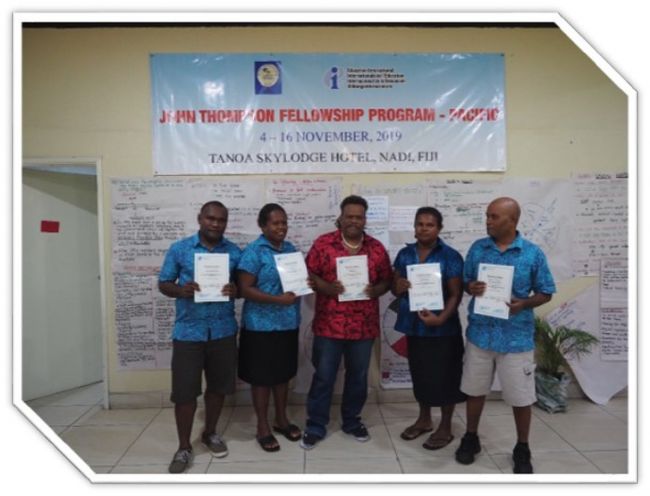The John Thompson Fellowship training, instrumental to developing unions and teacher quality in the Pacific
Conflict resolution, trade union negotiations, and the recruitment of young members were amongst the skills developed by trade unionists in the Pacific Islands at training conducted under the John Thompson Fellowship Programme for 2019-2022.
Twenty-four union representatives from five countries - Papua New Guinea, Tonga, Vanuatu, the Solomon Islands National Teachers’ Association, and Fiji – attended the training in Nadi, Fiji, from 4-16 November 2019.
Union history, mission statements, vision, and structures, communication, team building, and decision making were also covered in the training. The training for the Papua New Guinea Teachers Association, the Friendly Islands Teachers’ Union/Tonga, the Vanuatu Teachers’ Union, the Solomon Islands National Teachers’ Association, the Fiji Teachers’ Association, the Fiji Teachers’ Union, and the Association of the University of the South Pacific Staff/Fiji was organised in response to challenges faced by teacher unions and the education sector in the Pacific Islands.
The training programme was led by representatives from the Canadian Teachers’ Federation, the Australian Education Union, Education International’s Asia-Pacific Regional Office, and the Council of Pacific Education.
The John Thompson Fellowship format aims at delivering in-depth trade union training within two to three weeks, tackling all aspects of trade union work.
Capacity building
The training built the participants’ capacity to prepare a strategic plan to present to their respective unions’ executive committee in the next three months, and then implement in their respective unions.
The three main learnings that the participants took away from this training were:
• The importance of building a good strategic plan
• Becoming a good leader
• Developing negotiation and conflict resolution techniques
Participants also acknowledged the importance of having good communication tools, building strong, inclusive and sustainable union structures, and working towards youth empowerment. The training was so successful that almost four out of 10 (38 per cent) said they would change their behaviours as leaders, according to Anand Singh, Education International’s Chief Regional Coordinator for Asia Pacific.
Education International and the Council of Pacific Education will monitor progress made in implementing the union’s strategic action plans and are committed to provide the necessary technical support. Rigorous monitoring will ensure that activists who benefited from the training are in a position to strengthen their organisations through this training.
Background
The 14 Pacific Islands countries are home to two million people – half of whom are under 18. Altogether, 18 affiliates in nine countries are affiliated to EI.
The sectorial concerns about teacher and education quality, as well as high dropout rates from schools in the region, have led the resource-poor countries to seek assistance to improve educational quality. This has also triggered various reforms challenging the teachers’ status and conditions of service. There is room for improvement, however, in the capacity of some unions to stand up to governmental union-bashing tactics and internationally driven education reforms.
In addition, teachers and their unions operate in an environment strongly challenged by climate change, rising sea levels, natural disasters, droughts, floods and cyclones. Other challenges include persistent gender-based violence and poor progress in the achievement of the Millennium Development Goals. It can also be difficult to get the Sustainable Development Goals on to national development agendas and to report on progress of the Sustainable Development Goals. All these challenges are extremely demanding for teachers, whose unions already have to mitigate the negative impact of shifts in teacher employment policies and terms and conditions of service.

[Tue, 04 Feb 2020 15:35:00 +0000] | DIGG THIS
Website Development and Design by Cyblance
